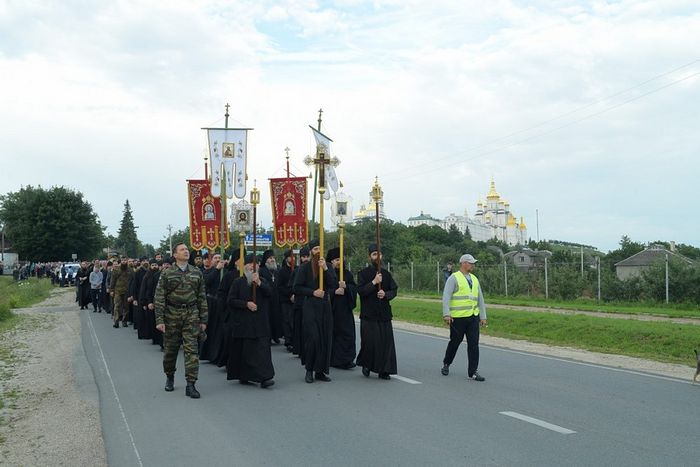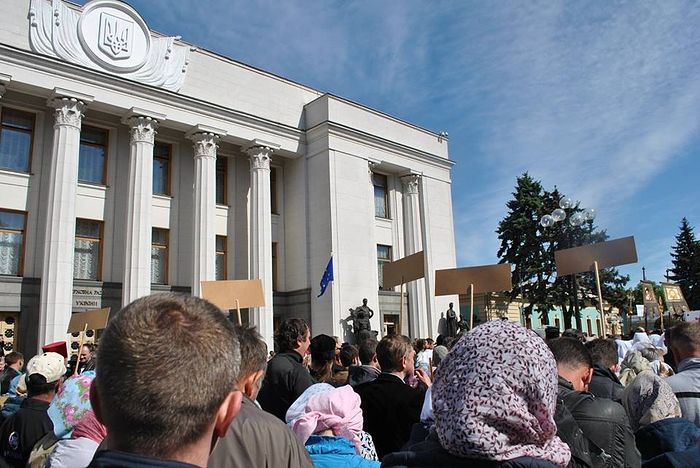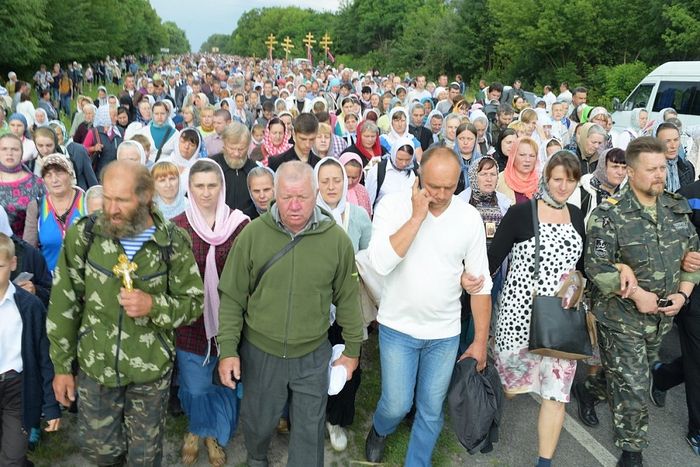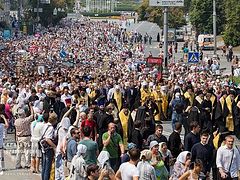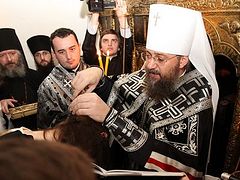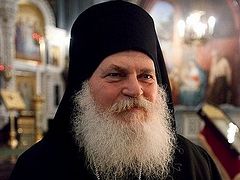Archpriest Vasily Rusinka, Representative of the UOC-MP in Ukraine’s Verkhovna Rada, tells how the Church-state relations in Ukraine have developed over the past two decades and what has now changed, and what the Church has been doing to protect Her rights from infringements by the new legislative initiatives promoted by some deputies.
—Fr. Vasily, since 2011 by the decision of the UOC-MP’s Holy Synod you have served as the Representative of the Ukrainian Orthodox Church in the Verkhovna Rada of Ukraine—the country’s supreme council. Over this period some significant changes in our life have occurred: following “the Revolution of Dignity”, radical political circles literally attacked the canonical Church, labelling Her as “separatist”, “Moscow’s myrmidon” and so forth. A wave of seizures of canonical churches by schismatics swept the country. How are the things with the higher echelons of power now?
—The Church-state relations have always been troubled. The “heritage” of the seventy-year period of the Soviet atheist regime left its mark in our politicians’ consciousness. They feel that “the Church must be ruled, controlled by and accountable to the state.” The first and most pronounced ambition after the collapse of the USSR and the appearance of Ukraine was “to put things in order” in the Church. The logic was simple: now that Ukraine is independent, the Church in Ukraine must become absolutely independent too by separating from the Moscow Patriarchate “by a command from above”. They did not take into account that back in 1990 (when the USSR still existed), with the Tomos1 of Patriarch Alexis II the Ukrainian Orthodox Church had been granted broad autonomy and self-governance, the right of establishing the UOC Holy Synod, and Her primate had been given the title “His Beatitude the Metropolitan”, as is the practice in a number of Local Orthodox Churches around the world. In other words, the Church in Ukraine had been granted “independence” before Ukraine declared itself an independent state.
However, the politicians wanted a controlled, “pocket” Church, which would be a part of the ideological apparatus forming the “national self-awareness” of masses. The radicals demanded “full Ukrainization”, the introduction of Ukrainian as the liturgical language, a ban on praying for the Patriarch of Moscow, and even union with Uniates and self-declared “Autocephalists” who came from overseas at the height of Gorbachev’s perestroika. Even today, many Ukrainian politicians and ordinary residents fail to understand that the Church lives according to Her own laws: not temporary political laws, but spiritual, inviolable laws established by God Himself. For She never participates in political processes; the Church teaches according to the Word of Christ, Render therefore unto Caesar the things which are Caesar's; and unto God the things that are God's (Mt. 22:21).
It was on that national and political wave that the schismatic Philaret (Denisenko) became a “patriarch”, having insidiously played the political game of the early nineties. He immediately suggested to Leonid Kravchuk that it would be good to “unite” the UOC with the Ukrainian Autocephalous Orthodox Church under the name “The UOC of the Kyiv Patriarchate” because the creation of a new denomination would “kill two birds with one stone”—it would put an end to the schism and ensure the autocephaly of the new “Church”, which would be recognized by world Orthodoxy. And he as a true patriot would become the leader of Ukrainian Orthodoxy.
And we well know that the new schism had very negative effects on the country’s religious life; and not only religious life. Philaret’s “slogans” and “ideas” that the canonical Church was “the tool of Moscow” were taken up by many politicians who are still manipulating them. It can be said that the split in Ukraine began with the religious schism initiated by the pseudo-patriarch Philaret.
The newly-elected Metropolitan Vladimir (Sabodan; +2014) was ignored by the authorities and the President himself for a long time until the great authority that the UOC-MP and its primate won in the whole of Ukraine and abroad finally made the powers that be change their policies towards the canonical Church. It was then that the first representative of the UOC-MP was sent to the Verkhovna Rada—it was Bishop Augustine (Markevich), now Metropolitan of Bila Tserkva.
—Batiushka, has the representative office of the UOC-MP at the Verkhovna Rada produced any results? Is the presence of a representative of the Church at the supreme legislative body effective at all?
—The Church has actively worked in the Rada’s core committees, we have good business relations with a number of deputies of all convocations who later held high state positions, headed ministries and government departments. Heads of state committees for religious affairs largely contributed to the normalization of the Church-state relations—to the restitution of Church property, churches and monasteries that had previously belonged to museums or had been in a state of neglect at various agencies, were prisons, medical institutions, and other services. During the previous Verkhovna Rada’s convocation we managed to initiate a number of bills. The most important issues were raised: to grant the Church legal entity status; to allow the Church to establish Her own educational institutions; to guarantee that diplomas in theology from Church education institutions are recognized by the state; and to repeal the following clauses from legislative acts: “The education system in Ukraine is secular”, and “The schools are separated from the Church.” The following possibilities were discussed more than once: to introduce military chaplains in Ukraine; to organize charities and social support; to make amendments to the Tag Code concerning religious organizations’ real estate objects; to integrate the Christian spiritual and moral values into the teaching and educational process; and to amend some Ukraine laws concerning partner relationships between the state, the schools, and the Church. And many other things were proposed.
Unfortunately, in the period after the Euromaidan Revolution the situation changed dramatically.
—On May 8 this year, thousands of Orthodox believers from different regions of the country held a rally near the Verkhovna Rada; thus the people expressed their protest against the infamous bills no. 4128 and no. 4511. They both were finally removed from the agenda but not withdrawn from consideration. Can you tell us how things are going now?
—These draft laws indicate a continuation of the war that some Ukrainian political forces have been waging against the canonical Ukrainian Orthodox Church.
During the tragic events on Maidan Nezalezhnosti (Liberty Square), namely on December 4, 2014, the bill no. 1244 was registered and submitted for consideration (the authors were People’s Deputy Yuri Bublik and others). It was sheer speculation against the background of the aggravation of the political situation with the view of “exposing the enemy on religious grounds”.
By pushing these bills, the people’s deputies showed their personal attitude towards the canonical Church and tried to set the society against the UOC-MP. It was proposed to obligate all religious organizations “whose governing centers are located outside Ukraine” to indicate the full name of their center. Beyond all doubt, they meant the Ukrainian Orthodox Church, “which is governed by Moscow”. First and foremost, that is not true. The Statute of the Ukrainian Orthodox Church (chapter 1, paragraphs no. 1 and 2) reads: “Paragraph 1. The Ukrainian Orthodox Church is self-governed and has an independent structure. Paragraph 2. The bodies of supreme Church authority and administration of the Ukrainian Orthodox Church are the Council of the Ukrainian Orthodox Church, the Council of Bishops of the Ukrainian Orthodox Church, and the Holy Synod of the Ukrainian Orthodox Church chaired by the Metropolitan of Kiev and All Ukraine.” Thus, the “governing center” of our Church, mentioned in the bill, is situated in Kiev. Paragraph no. 1 of section no. 2 also reads: “In the Ukrainian Orthodox Church the supreme authority belongs to the Council of the Ukrainian Orthodox Church whose jurisdiction is limited as defined by the canons and the present statutes.”
As we see, the Ukrainian Orthodox Church has no “foreign centers”. The Ukrainian Orthodox Church is in prayerful and canonical communion with the Patriarchate of Moscow—during services She prays for the Patriarch of Moscow as the head of the ROC (as UOC-MP is a self-governing part of ROC), but there is no subordination in administrative, legal or human resources terms.
—What is the aim of these politicians?
—The authors of these draft laws deliberately resort to political insinuations, misleading the public, trying to cash in on people’s political sentiment, creating religious tension. Defying the main law, they grossly violate article no. 35 of the Constitution of Ukraine, which clearly states that the Church and religious organizations in Ukraine are separate from the state. Therefore, the state has no right to demand that a religious organization change its legal name; there are no grounds for that.
—And what are the views of world religious communities on these bills?
—Representatives of the World Council of Churches (WCC), International Institute for Protection of Human Rights in the Eastern Europe, the Holy See’s Secretariat of State, primates and representatives of autocephalous Orthodox Churches, the Institute for Religious Freedom in Ukraine, the All-Ukrainian Council of Churches, famous political analysts, religious studies specialists and lawyers, and almost all religious denominations of Ukraine (with the exception of the “Kyiv Patriarchate”) have openly condemned the proposed bills. The schismatics of Philaret (Denisenko), who illegally established their uncanonical structure, see these draft laws as a useful instrument of their struggle against the canonical Ukrainian Orthodox Church.
Recently the possibility of addressing an appeal to an international European expert body on legal matters was discussed. It will be the European Commission for Democracy through Law, better known as the Venice Commission. The main area of the Commission’s work is analysis of legislative provisions of member states relating to the issue of constitutional rights and freedoms. Ukraine has been a member of the Venice Commission since 1992. The Venice Commission’s opinions are used by the Parliamentary Assembly of the Council of Europe (PACE) as a reflection of the European standards of human rights, the principles of democracy, and the supremacy of law.
Glory be to God, our Church has already raised the question at the international level concerning the crude violation of constitutional rights and freedoms in our country. As is known, Bishop Victor (Kotsaba) of Baryshevka, UOC-MP’s representative at international organizations, participated at the PACE meeting dedicated to human rights in Austria and in the Twenty-Fourth General Assembly of the Inter-Parliamentary Assembly on Orthodoxy, held at the Italian Parliament. At these European forums we have notified the world community of the flagrant violation of the Ukrainian Constitution and the destructive attitude of some representatives of the state and public authorities towards the canonical Ukrainian Orthodox Church.
—Father Vasily, can you tell us if the degree of tension in religious life of Ukraine and the Church-state relations has changed?
—Yes, definitely. There is a considerably lesser degree of political tension in the society in general, despite the ongoing armed conflict in the east of Ukraine. But time has put everything into its rightful place: The people who believed the promises of “the Revolution of Dignity” are now totally disappointed. The politicians that came to power have betrayed their trust. The standard of living in Ukraine is now several times lower… Our people were given an opportunity to make an objective judgment: Who are our friends and who are our enemies. The Orthodox Church remains the spiritual uniting force of the Ukrainian people. The Church is the leader of Ukrainian confidence rating—She consolidates people living in the east and the west of Ukraine regardless of their political views and sentiment. The Lord has once again confirmed the Gospel truth: I will build My Church; and the gates of hell shall not prevail against It (Mt. 16:18).

